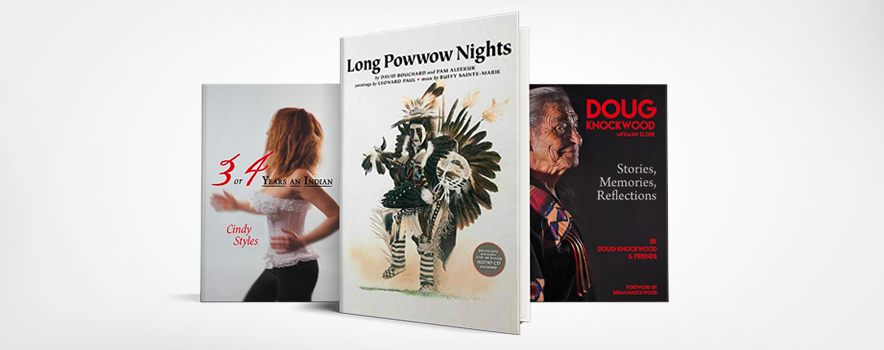 Written by Shelby, staff member, Alderney Gate Public Library
Written by Shelby, staff member, Alderney Gate Public Library
In recognition of Mi’kmaq History Month, we would like to share some of our Mi’kmaw books. Here are 3 titles you will want to check out.
Doug Knockwood Mi’kmaw Elder. Stories, Memories, Reflections
by Doug Knockwood & Friends
Doug Knockwood’s autobiography touches on the journey of his rough early life, as a survivor of the Shubenacadie Indian Residential School, and to becoming a respected community elder and world leader.
In his early life, Elder Knockwood struggled with alcoholism. Thanks to the Alcoholics Anonymous program, he faced his addiction, only to go on and deliver the AA program not only to other Indigenous communities, but to people and communities across North America.
There are many special things about this book.
First are the stories about his family, who cared for, taught, and loved him. These stories remind the reader that a person’s story is not their own—there are others involved who influence our paths in life.
Another special thing about Elder Knockwood’s book is the descriptions and history of the places where he lived. Best of all are the contributions of “& Friends” in a series of anecdotes from Elder Knockwoods friends and community. One powerful story comes from Theresa Meuse, whose family Elder Knockwood saved from being torn apart due to her parent’s alcoholism.
Theresa remembers:
“He took care of us eight kids and his wife. Doug was always his constant. Everybody should have one constant in their life. If they have two, that would be great. Ours would be Doug.” (pg 82).
Doug Knockwood passed away on June 16, 2018 and his life story is an inspiration to read.
3 or 4 Years an Indian
by Cindy Styles
In 2011, the Canadian government officially recognized the Newfoundland Qalipu Mi’kmaq.
Cindy Styles went through the process of applying for band membership and had to prove her ties to her heritage. That is what the book is technically about, but Cindy Styles is not limited by the conventional narrative of biography.
This book features not only Cindy's struggle trying to prove her identity and heritage to Indigenous and Northern Affairs Canada, but also her hilarious ramblings about things like Rob Ford, her endless digressions and adendums, and photographs that poke fun at the separation of Indigenous and white identity. In her “Guide to Reading this Book” she states “This is my book, so it’s a bit of fun.” I think that captures the mood of this book because it is undeniably and specifically her voice and tone. She writes in her own unique and unconventional way. And it is definitely a bit of fun.
The book is also a reflection on Indigenous identity. Styles is asked by the government to provide documents proving her relationship to the Qulipu band, such as travel habits, personal photos, and even text messages. “What kinds of text messages are Indians supposed to have?” Styles wonders. She makes it quite clear throughout the book that she already has a clear identity. She can rap Eminem’s Survival, and dance like Beyonce to Beethoven; she is white and she is Indigenous.
“So how could I give up any of my loves, to be an Indian as narrowly defined by the government? … I could not nor would not deny part of who I am, white or Indian. I feel awesome” (pg 69).
Long Powwow Nights
by David Bouchard and Pam Aleekuk; paintings by Leonard Paul; music by Buffy Saine-Marie
Long Powwow Nights is a wonderful picture book with an accompanying CD featuring both English and Mi’kmaq narration of the book. The 4 people involved in this book are all renowned Aboriginal artists.
The illustrations by Leonard Paul—a Mi’kmaw artist from Halifax and graduate of both the Nova Scotia College of Art and Design and Acadia University—are beyond beautiful. The paintings make this book come alive with their realistic depictions of Powwow dancers. The texture brought forward by the artist is incredible. It's as if one can actually hear the feathers ruffling together or the beads clicking as they dance. In every painted person’s expression is a sense of pride.
The poetry is written by David Bouchard (Metis) and Pam Aleekuk (Metis). The poem is a lovely reflection on the narrator’s relationship with their mother. There are no gender-specific pronouns used so it is easy to understand the perspective of the authors. The feelings of pride, longing, and grief come through tenderly.
I would recommend giving the CD a listen in both languages. Each language has a different narrator and some interesting effects and sounds, which give a different mood to each part of the book. And, listening to the Mi’kmaq language version, with its different sounds and rhythms, gives the poetry another dimension.
Lastly, there is a song included on the CD written by the famous Cree singer/songwriter Buffy Sainte-Marie. The song, written in 1996, is called Darling Don’t Cry, and has a bright and triumphant tone.


Add a comment to: Mi’kmaq Stories for October